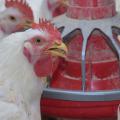Hatching egg storage period
Eggs saved for hatching are very perishable and their viability is greatly affected by the quality of storage conditions. If properly stored, the number of hatching failures can be kept to a minimum. It is recommended that most eggs be stored no longer than 1 week. Storing eggs longer will produce a greater incidence of hatching failures.
The maximum storage period for chickens is about 3 weeks. Some turkey eggs will survive for 4 weeks, but quail will have difficulty developing from eggs stored longer than 2 weeks.
Hatching eggs should be collected soon after lay and maintained at 50-65o F. The eggs must not warm to above 65o F. unless they are being prepared for immediate incubation. Relative humidity in the storage facility should be maintained at 70 percent and daily egg turning or repositioning is recommended to prevent the yolk from sticking to the inside surface of the shell.
Refer to one of the incubation related publications listed previously for a more thorough discussion on hatching egg storage.
Publications
News
STARKVILLE, Miss. -- Until an avian flu vaccine for chickens or other alternative is federally approved, commercial poultry operations in the U.S.
STARKVILLE, Miss. -- If egg prices have seemed higher than ever lately, it’s because they are, and consumers can place much of the blame squarely at the feet of the ongoing bird flu outbreak.
With highly pathogenic avian influenza, or HPAI, in the environment in Mississippi, owners of backyard flocks have to take extra steps to keep their chickens healthy.
Avian influenza poses an extremely low risk to human health and none to food safety in Mississippi, but its presence poses a risk to backyard flocks and the state’s $3 billion commercial poultry industry.







